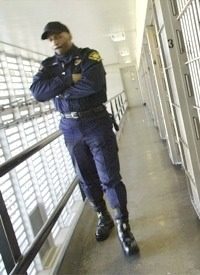
A three man panel of the United States Ninth Circuit Court of Appeals, by a two to one split vote, has determined that Washington state law, which prohibits convicted felons from voting, violates the Voting Rights Act of 1965.
The ruling was based upon the statistical fact that blacks are much more likely to be in prison in Washington State than other racial groups, considering the percent of the state’s population that is black. The federal appellate court was ruling on a federal district court decision in 2000 which alleged that Muhammad Shabazz Farrakhan had not been improperly denied his right to vote under the Washington law.
The appellate decision will open the door to legal challenges in other states in the Ninth Circuit. Every state in the circuit has a law similar to Washington’s law and only two states in America, Maine and Vermont, allow convicted felons who are behind bars, like Muhammad Shabazz Farrakhan, to vote. Racial disparity in criminal conviction and in criminal sentencing has been a contentious issue since the early 1990s, when federal bills like the Racial Justice Act sought to create presumptions of bias in sentencing if minorities receive a disproportionately large percentage of convicted or sentenced inmates.
The concept can be challenged on any number of grounds. The American judicial system is based upon individual, not collective or social, justice. Simply counting the number of individuals of a certain race who are convicted cannot prove specific cases of injustice. The notion that criminal convicted or sentenced inmates ought to fit into a particular pattern has no basis beyond a general theory that all classes of Americans behave the same way. Women, for example, are a majority of the population in Washington State but a very small minority of the prison population. Asian Americans are also underrepresented in the prison system compared to their percentage of the population.
Striking down the disenfranchisement of prison inmates on the grounds of statistical racial inequality would logically lead to challenges to other restrictions on voting. If greater percentage of the teenage population of Washington State is black, for example, then could the age restriction on voting not be challenged on the grounds of racial inequality? Would not any voting law which had the incidental effect of reducing the number of black voters be suspect?
The Voting Rights Act of 1965 almost certainly did not intend this sort of result. That law was instead directed at patterns of actual disenfranchisement in the South. Washington State has no history of creating obstacles to blacks voting. The implication of the ruling — a common implication in so many legal actions driven by notions of “social justice” — is that the government of Washington State somehow is responsible for the results of systems of justice which do not produce the sort of statistical equality which litigious civil rights attorneys speculate would be “fair.”
Another factor apparently ignored by the Ninth Circuit panel is that the overwhelming majority of the victims of crime by blacks in Washington State are themselves black. Theft, assault, robbery, rape, and murder by black inmates disproportionate hurt black crime victims in the state. Providing the additional sanction of disenfranchisement against prison inmates ought to provide more protection to these black crime victims. Reducing the number of imprisoned black men — if those men were justly and faired convicted and sentenced — puts blacks in Washington State at greater risk.
Photo of Wash. state prisons Lt. Clan Jacobs: AP Images



